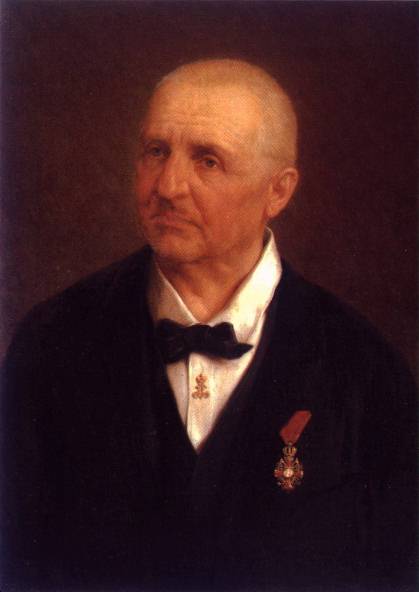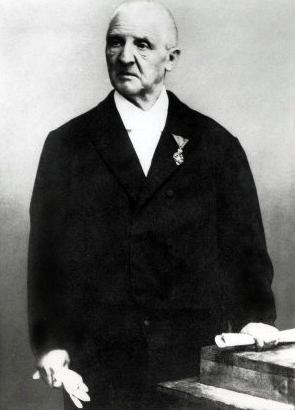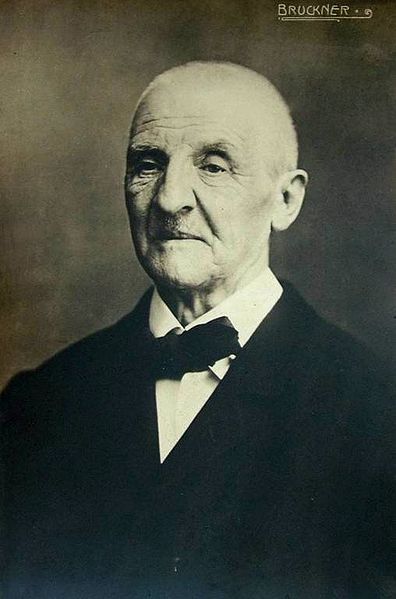<Back to Index>
- Geologist Friedrich August von Alberti, 1795
- Composer Anton Bruckner, 1824
- Politician and Writer François René, vicomte de Chateaubriand, 1768



Anton Bruckner (4 September 1824 – 11 October 1896) was an Austrian composer known for his symphonies, masses, and motets. The former are considered emblematic of the final stage of Austro-German Romanticism because of their rich harmonic language, complex polyphony, and considerable length. Bruckner's compositions helped to define contemporary musical radicalism, owing to their dissonances, unprepared modulations, and roving harmonies.
Unlike other radicals, such as Wagner or Hugo Wolf who fit the enfant terrible mould, Bruckner showed extreme humility before other musicians, Wagner in particular. This apparent dichotomy between Bruckner the man and Bruckner the composer hampers efforts to describe his life in a way that gives a straightforward context for his music. His works, the symphonies in particular, had detractors, most notably the influential Austrian critic Eduard Hanslick, and other supporters of Brahms, who pointed to their large size, use of repetition, and Bruckner's propensity to revise many of his works, often with the assistance of colleagues, and his apparent indecision about which versions he preferred.
Anton Bruckner was born in Ansfelden on September 4, 1824. His father, a schoolmaster and organist, was his first music teacher. He died when Anton was 13 years old. Bruckner
worked for a few years as a teacher's assistant, fiddling at village
dances at night to supplement his income. He studied at the Augustinian monastery in St. Florian, becoming an organist there in 1851, where most of the repertoire consisted of the music of Michael Haydn, Johann Georg Albrechtsberger and Franz Joseph Aumann. In 1855, he took up a counterpoint course with Simon Sechter. He later studied with Otto Kitzler, who introduced him to the music of Richard Wagner,
which Bruckner studied extensively from 1863 onwards. Bruckner
continued his studies to the age of 40. Bruckner's genius, unlike that
of a child prodigy (Wolfgang Amadeus Mozart,
for example), did not appear until well into the fourth decade of his
life. Furthermore, broad fame and acceptance did not come until he was
over 60. A devout Catholic who loved to drink beer, Bruckner was out of step with his contemporaries. In 1861 he had already made the acquaintance of Franz Liszt who,
like Bruckner, had a strong, Catholic religious faith and who first and
foremost was a harmonic innovator, initiating the new German school
together with Wagner. Soon after Bruckner had ended his studies under
Sechter and Kitzler, he wrote his first mature work, the Mass in D
Minor. In 1868, after Sechter had died, Bruckner hesitantly accepted Sechter's post as a teacher of music theory at the Vienna Conservatory, during which time he concentrated most of his energy on writing
symphonies. These symphonies, however, were poorly received, at times
considered "wild" and "nonsensical". He later accepted a post at the Vienna University in 1875, where he tried to make music theory a part of the curriculum. Overall, he was unhappy in Vienna, which was musically dominated by the critic Eduard Hanslick.
At the time there was a feud between advocates of the music of Wagner
and Brahms; by aligning himself with Wagner, Bruckner made an
unintentional enemy out of Hanslick. However, he was not without supporters; Deutsche Zeitung's music critic Theodor Helm, and famous conductors such as Arthur Nikisch and Franz Schalk constantly
tried to bring his music to the public, and for this purpose proposed
'improvements' for making Bruckner's music more acceptable to the
public. While Bruckner allowed these changes, he also made sure in his
will to bequeath his original scores to the Vienna National Library,
confident of their musical validity. Another proof of Bruckner's
confidence in his artistic ability is that he often started work on a
new symphony just a few days after finishing the previous one. In addition to his symphonies, Bruckner wrote masses, motets and other sacred choral works, and a few chamber works, including a string quintet. Unlike his romantic symphonies, some of Bruckner's choral works are often conservative and contrapuntal in
style; however the Te Deum, Helgoland, Psalm 150 and at least one Mass
demonstrate innovative and radical uses of chromaticism. Biographers generally characterize Bruckner as a very simple man, and
numerous anecdotes abound as to his dogged pursuit of his chosen craft
and his humble acceptance of the fame that eventually came his way.
Once, after a rehearsal of his Fourth Symphony, the well-meaning Bruckner tipped the conductor Hans Richter:
"When the symphony was over," Richter related, "Bruckner came to me,
his face beaming with enthusiasm and joy. I felt him press a coin into
my hand. 'Take this' he said, 'and drink a glass of beer to my
health.'" Richter, of course, accepted the coin, a Maria Theresa thaler, and wore it on his watch-chain ever after. Bruckner
was a renowned organist in his day, impressing audiences in France in
1869, and England in 1871, giving six recitals on a new Henry Willis organ at Royal Albert Hall in London and five more at the Crystal Palace. Though he wrote no major works for the organ, his
improvisation sessions sometimes yielded ideas for the Symphonies. He
taught organ performance at the Conservatory; among his students were Hans Rott and Franz Schmidt. Gustav Mahler, who called Bruckner his "forerunner", attended the conservatory at this time. Bruckner
never married; he was attracted to teenage girls, who turned down the
proposals of the older man. One such was the daughter of a friend,
called Louise; in his grief he is believed to have written the cantata
"Entsagen" (Renunciation). His affection for teenage girls led to an
accusation of impropriety where he taught music, and while he was
exonerated, he decided to concentrate on teaching boys afterwards. His
calendar for 1874 details the names of girls who appealed to him, and
the list of such girls in all his diaries was very long. In 1880 he
fell for a 17-year-old peasant girl in the cast of the Oberammergau Passion Play.
His interest in girls appears to have been based on the assumed virtue
retained through their being young, and lasted as long as they seemed
worthy of marriage; he feared sin. His unsuccessful proposals to
teenage girls continued into his seventies; one potential relationship
that might have been suitable when he was older came to nothing because
the girl would not convert to Catholicism. In July 1886, the Emperor decorated him with the Order of Franz Joseph. Bruckner
died in Vienna in 1896, of natural causes. He is buried in the crypt of
St. Florian monastery church, right below his favorite organ. The Anton Bruckner Private University for Music, Drama, and Dance, an institution of higher education in Linz, close to his native Ansfelden, was named after him in 1932 ("Bruckner Conservatory Linz" until 2004). The Bruckner Orchester Linz was also named in his honor.